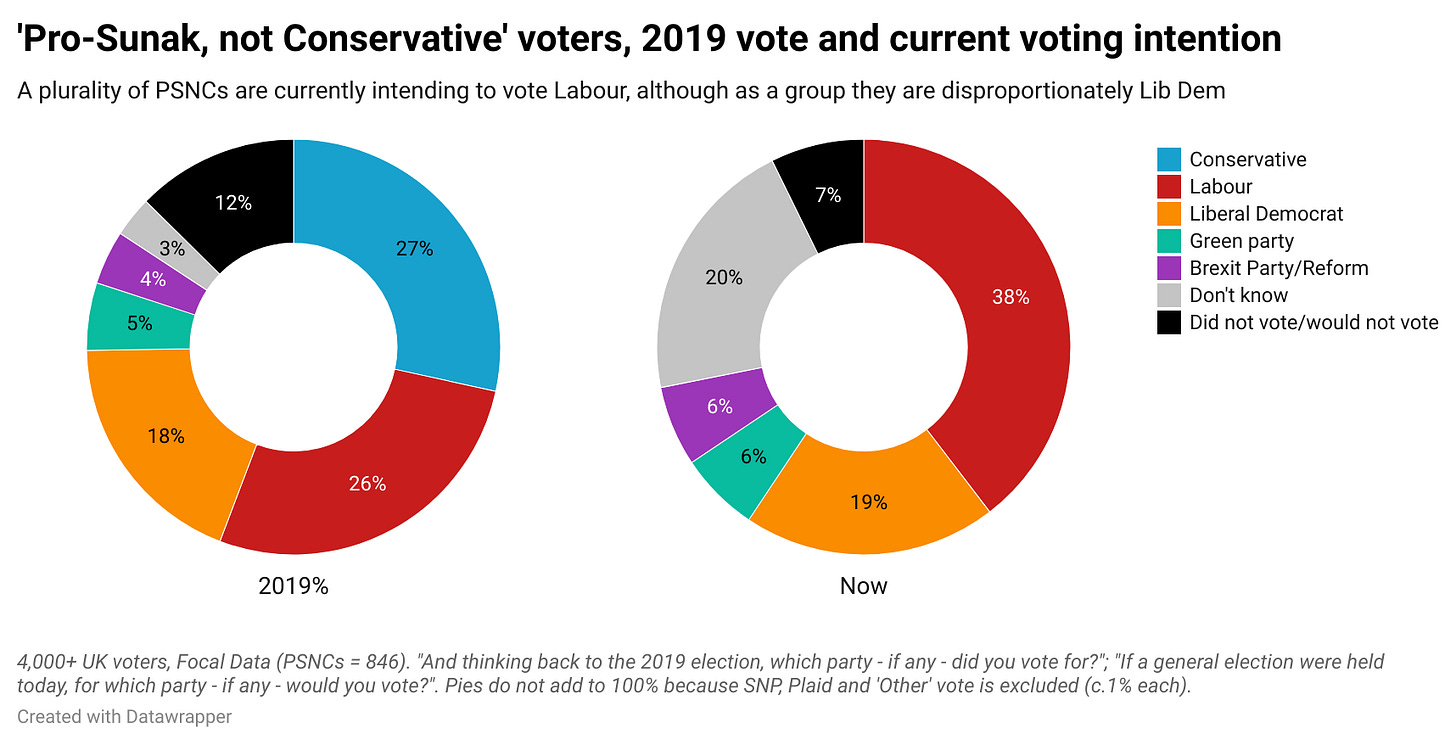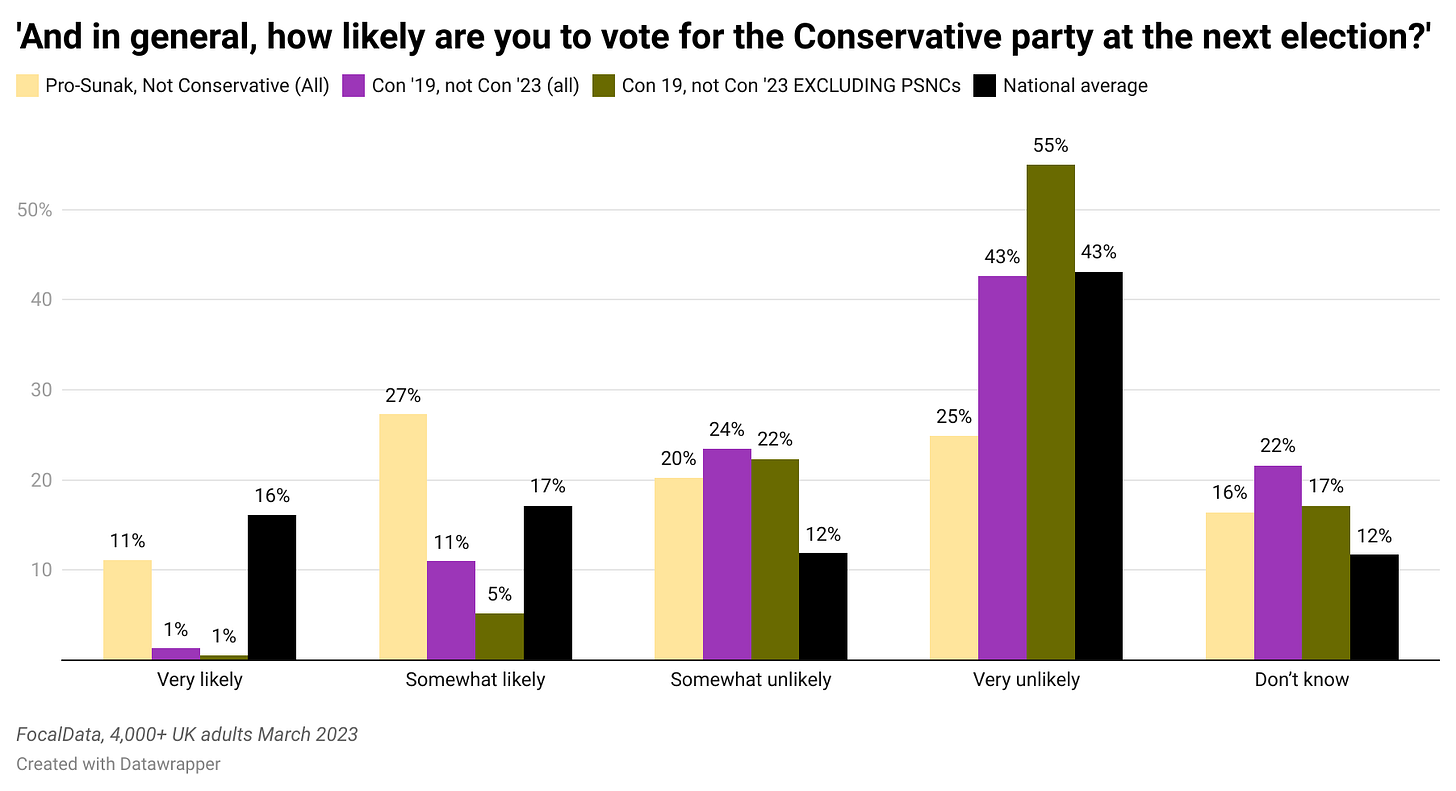In the last few months, some attention has been drawn to a striking phenomenon in the opinion polls.
This is that while Rishi Sunak’s personal ratings are fairly elastic – they go up when he has positive news cycles, such as around the Windsor agreement – this is not really feeding through into Conservative voting intention to the same extent. There remains a chunk of the population who like the PM, but don’t currently want to vote for his party.
Josh over at Beyond The Topline has probed this a bit and hypothesised that some of this is accounted for by Remainers.
But beyond these forays, not too much is known about this group we can loosely call ‘Pro-Sunak, not Conservative’ or PSNCs (I can’t think of a catchier name, sorry). They are not the only group worthy of attention in the electorate, of course. But they are relatively under-examined compared.
To get at them, I did some new polling with the great team at FocalData; a 4,000 person conducted at the end of March 2023. It was commissioned via my day job at ECF/GSCC, as I was curious on this group’s climate views – but the wider results were sufficiently interesting that it felt a shame not to share them.
Firstly, some definitions. PSNCs here are people who express a very or somewhat favourable view of Rishi Sunak, but are not currently intending to vote Conservative. They constitute about 21% of the population – a pretty sizable group. Clearly they are not homogenous, but it can be useful to look a bit closer at the rough character of them as a whole.
So what did the results show? A fuller deck is here, but below are some highlights:
Political profiling
Straight off the bat it’s worth noting that this is not a group totally closed off to voting Conservative, but neither is there any inevitability. They are genuinely ambivalent right now.
Politically they are fairly diverse. About 27% did actually vote Conservative in 2019 - PSNCs represent about a third of Conservative defectors overall and 31% of all Con-to-Lab switchers.
That said, the most obvious thing about them is that they are disproportionately Lib Dem, both in their 2019 vote and current intentions.
They are also indeed more Remain – although not overwhelmingly so. From here i’ll start to include both the current Conservative base and Conservative defectors as a whole, for reference, because I think interesting divergences start to open up.
Demographics
From this, we can see two particularly striking things: PSNCs are younger than the national average, and much younger than either the Conservative base or Conservative defectors overall. A majority of PSNCs are under 45, in fact. They’re more graduate partly as a result.
They are also notably less white, over-indexing in particular among British Asians. Some of the PSNC effect could be voters who have an affinity to Sunak as the first Asian PM, but who aren’t sure about his party (James Kanagasooriam has noted before that the presence of ethnic minority voters can sometimes explain why constituencies that ‘should’ be Conservative are not).
You can also see in the deck that PSNCs are higher income than average, and Con defectors overall.
Social values
Running a standard set of values questions by this group is also interesting. They did not neatly fit into the ‘Remainer graduate in Blue Wall seats’ stereotype.
PSNCs are more socially conservative overall, like the nation overall - though PSNCs aged under 45 notably more socially conservative than their age cohort. However, they simply wear this with a lot less intensity than the Conservative base or Conservative defectors overall - who are more defined by strongly held conservative views.
PSNCs also have less uniform views on this axis. They are more likely to think compassion for the suffering is an important virtue, and also notably more likely to sympathise with the plight of Muslims.
What else jumps out is how much more economically liberal they are. A plurality agree with the sentiment that ‘ordinary working people get their fair share of the nation’s wealth’. This is a fairly unusual view among the public, and strikingly different to Conservative defectors overall. Many of the latter are the famous ‘cross-pressured’ (aka ‘hang the paedos, fund the NHS’) voters with left wing economic views but authoritarian social views.
I’ll come back to what this tells us at the end, but for now let’s see how it shapes what issues are most important to them.
Issues
As with most voters, the economy and NHS dominate PSNC’s top 2 priorities - these are the fundamentals of the next election.
But the second tier is also interesting. PSNCs are much less likely to prioritise immigration than the Conservative base or Conservative defectors overall. They are more likely to prioritise issues such as climate change/the environment, housing and crime.
On party trust, the scale of the Conservative’s challenge becomes clear – PSNCs prefer Labour to the Conservatives on every salient issue. The only exception is the economy, where their preference for the Conservatives marks PSNCs out from the public at large.
While they back investment overall, they are more concerned with debt and deficits than Con defectors and voters at large.
Immigration
The lower salience given to immigration creates some interesting dynamics when we dive into the issue a bit more. PSNCs are not ‘open borders’ by any means – but they are a lot more ambivalent than other potential Conservative audiences.
They are much more likely than the bulk of the Conservative 2019 coalition to think immigration enriches society, and less likely to think the government’s asylum policy is not strict enough.
On the recent Gary Lineker row, though, PSNCs break fairly clearly in Lineker’s favour than Con defectors overall – both on Lineker’s sentiments and his right to say it. It underscores the risk of indulging in these more divisive culture war fights. They work with some target voters, but they push other groups of winnable voters away, reinforcing a ‘nasty party’ image, even when those voters themselves are supportive of controls.
Climate
A quick word on climate since this was what I was originally interested in. Even I was surprised by how pro-climate PSNCs are. It is one of their defining characteristics, in fact - likely a function of their age.
As befits the greater salience they give to the issue, across a range of measures they are both more supportive of Net Zero and more willing to bear cost or inconvenience to make it happen.
This highlights a risk for the Conservatives in their current approach to Net Zero – increasingly one of slight dither and drift – and in the potential for Labour attack on it in the election.
Reasons to vote Con/not vote Con
Finally, I tested a range of reasons to vote Conservative or not, to see what is top of mind for PSNCs.
Lockdown parties come top, showing again the madness of some parts of right trying to re-litigate this.
The pull factors, as you’d expect, orientate mostly around the PM personally. But it’s notable how the economy features, despite lingering anger over the mini-Budget. Sunak’s steadier approach compared to Truss is clearly an issue of relative strength for the Tories among these voters.
So what?
Crudely speaking, PSNCs look a bit like the sort the Conservatives have lost since the mid 2010s: Remain but pragmatically so, younger, less white, liberal on economics; big on the environment; moderately socially conservative but with a social justice streak.
They are, to my mind, not a bad thumbnail sketch of what a Cameroon-era ‘Compassionate Conservative’ looked like.
They like the PM, and their values suggest they ‘look’ Conservative - but they are clearly being put off his party.
In this sense they underscore a potential dilemma for the PM. To what extent does he try to re-assemble the Johnson coalition of 2019, focused on highly socially conservative but egalitarian voters - or to what extent does he go for something else, maybe something that looks a tiny bit more like the Cameron-Osborne coalition from 2015?
A Conservative strategist would point out that the former coalition is likely more efficiently geographically distributed, so would secure a bigger majority.
That is almost definitely true (although without an MRP of PSNCs it’s hard to be certain).
But here is the rub: much of that Johnson coalition is also much further out of reach at present, as you can see below. The bulk of Con 2019 defectors quite strongly dislike both the PM and the Conservative party.
PSNCs on the other hand are not only a large group, covering 2019 voters but also Lib Dem and Labour voters, but one that is actually open to voting Conservative. They are the lowest hanging fruit right now.
But arguably it’s not just the damage done by Sunak’s predecessors that is stopping him converting among these voters. It’s partly PM’s governing strategy itself. Letting Lee Anderson loose to pick fights with footballers, Suella Braverman with ‘lefty lawyers’ and civil servants; seeking to heighten the salience of migration at all costs.
A Sunak government more focused on converting PSNCs would look different in important ways. While not ignoring immigration, it would dial down the divisiveness. It would not be looking to weaponise the trans debate. It would dial up its focus on issues like climate and housing, while attacking Labour over fiscal issues not cultural ones.
No 10’s answer on this right now is to try and straddle both coalitions. The plan, as told to Tim Shipman recently, is for “highly targeted” messaging at both more moderate and populist voters. The PM ‘floating above’ the fray.
This is sensible at one level, but it can unravel; particularly because the two paths produce comms strategies which trade-off against each other. It’s hard to do culture war quietly. Look at how much the Lineker row crowded out less exciting but more temperate coverage of Sunak’s deal with Macron on small boats.
Maybe this will all work out. Perhaps an improving economy helps Sunak with both groups, with his personal charm further mopping up PSNCs and action on small boats helping him with more socially conservative voters.
But maybe not. Maybe instead No 10 will fall between the cracks; chasing a group he was never going to win back en masse while spurning the gaze of those more inclined. Either way, it’s a dynamic worth keeping an eye on as the election moves into view.
Full deck is here. DM me on Twitter if you would like the data.
An extra thanks to Manon Allen at FocalData for helping me do this polling.




















